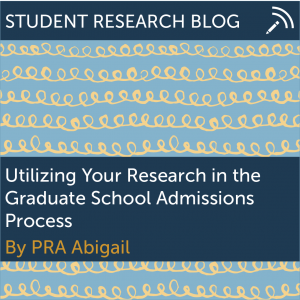 By Abigail LaFontan, OUR Peer Research Ambassador
By Abigail LaFontan, OUR Peer Research Ambassador
Applying to graduate school can be an intimidating process, but learning to use your research as a tool can boost your confidence and the power of your application or interview. I just finished applying to and receiving decisions from several law schools so, with my personal experience fresh in mind, I’m going to highlight some of the factors, related to my research experience, that I found to be most important during the graduate school application process.
During the application process, it is important to show the school personnel who you really are and why they want you. Research experience can play a huge hand in this because not only do you develop professional skills through research projects but you also experience personal growth. There are two specific points in the process where it’s important to highlight your research and how you have grown through the experience.
1. In the Application: It is early in the fall semester, you have taken the prerequisite exam and now you are ready (though in a bit of a post-LSAT/MCAT/GRE daze) to prepare your applications to continue your education. This is your chance to catch the admissions representative’s eye, to claim their attention and your seat in the incoming class. Keep these points in mind:
- Always make sure to present your research on your resume and at any other relevant points on the application (all applications are different!).
- Research the programs to gauge how to present your research in the most impressive way for that program.
- If you’ve engaged in a few different research projects, choose which ones to highlight. These could be projects that show a new side of your interests or experience, or they may be the most relevant to the work you will be doing at that school.
- There’s power in the soft skills. Make sure to talk about how you have personally grown through your experiences. Whether you are more confident in yourself as a researcher, you built your project management or organizational skills, or you’ve enhanced your problem solving skills, these skills and attributes matter!
- Pull the skills out of the subject. Sometimes the topic of the research may not be relevant, but the skills still are!
- Or vice versa, you can highlight the topic to show interest and experience even if you did not learn noteworthy new skills.
2. While visiting schools: Whether you’re visiting schools to solidify where you want to apply, or interviewing to secure your spot, take advantage of the chance to talk about your research and ask questions! These handy tips can help:
- If you want to pursue research at the graduate level, then make sure to ask about resources to do that at the schools you visit!
- Reflect on where you’d like to take your research. If it’s another subject area or building new skills in the same area, then seek out those resources on your visit.
- If one of your past projects helped you build a certain skill that you really enjoyed (maybe it’s managing large projects or leading an educational seminar), ask around during your visit to see if there are any opportunities for you to put those skills to use!
- Talk with faculty who are specifically in the area in which you would like to work and see how your experiences line up with what they are doing!
- Have confidence in your experiences, even if they are in a subject area that you are not pursuing in graduate school. Multidisciplinary experience is highly sought out by admissions representatives!
Most importantly, always remember how accomplished you are. Research is a great way to get your foot in the door but it doesn’t mean that once you start in one field you cannot move to another! Use your experiences as a tool to show graduate school admissions personnel and faculty that you have succeeded in gaining all these new skills. This experience naturally highlights your strong work ethic and motivation. As someone who is taking the law school route, I found my research experience to be very important during my admissions process and I wasn’t even applying to a research based graduate program! It all about highlighting the soft skills and experiences you have had, and realizing how applicable they are to your future goals.
Abigail is a senior majoring in Political Science and minoring in French. Click here to learn more about Abigail.